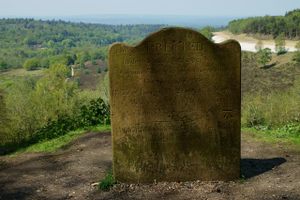
Nestled in Hindhead Commons and Devil's Punchbowl is a Grade-1 listed gravestone. Few know of the "Unknown Sailor," an anonymous mariner, who met his demise in September 1786 at Hindhead in Surrey. His assailants met justice when they were publicly executed on Gibbet Hill the following year.
According to the tale, a sailor was documented as having visited the Red Lion Inn in the village of Thursley. It was September 1786. He had been on his way back from London to rejoin his ship in Portsmouth. During his visit, the sailor encountered fellow seafarers: James Marshall, Michael Casey, and Edward Lonegon. He generously treated them to drinks and food before departing with them towards Hindhead Hill. Unfortunately, without further explanation as to why, this journey ended in tragedy as the trio murdered him. They robbed him of his belongings and left his lifeless body stripped. The trio were apprehended attempting to sell the sailor's stolen items at the Sun Inn in Rake.
The Hampshire Chronicle reported the gruesome incident, detailing how the perpetrators nearly decapitated their victim, left him unclothed, and disposed of his body in a valley. Fortunately, locals stumbled upon the scene, raising the alarm and leading to the swift capture of the criminals at Mr. Adams' Sun Inn in Rake. After six months, the perpetrators faced trial at the Kingston assizes. Two days following the trial's conclusion, on Saturday, April 7, 1787, they met their fate when they were publicly hanged on a triple gibbet near the site of their heinous crime in Hindhead.
The unknown sailor was buried in Thursley churchyard, with a gravestone financed by the village's inhabitants. It is argued that the sailor's identity was Edward Hardman, born 1752 in London, although this has never been confirmed. Today, a commemoration of his story exists in this gravestone. The stone is well worth a visit due to its little-known mentions in British literature (with the likes of Charles Dickens having been inspired by the event), as well as in admiration of the intricately carved motif of the sailor's murder.

Post a Comment